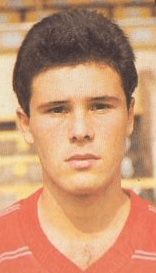Jean-Marc Bosman facts for kids

Bosman with RFC Liège
|
|||
| Personal information | |||
|---|---|---|---|
| Date of birth | 30 October 1964 | ||
| Place of birth | Liège, Belgium | ||
| Position(s) | Midfielder | ||
| Senior career* | |||
| Years | Team | Apps | (Gls) |
| 1983–1988 | Standard Liège | 86 | (3) |
| 1988–1990 | RFC Liège | 3 | (0) |
| 1990–1991 | Saint-Quentin | 12 | (1) |
| 1990 | Saint-Denis | 0 | (0) |
| 1990–1995 | Olympic Charleroi | 2 | (0) |
| Total | 103 | (4) | |
| International career | |||
| Belgium U21 | 20 | ||
| *Club domestic league appearances and goals | |||
Jean-Marc Bosman (born 30 October 1964) is a former professional footballer from Belgium. He played as a midfielder. He is famous for a legal case that changed how football players move between clubs. This case is known as the Bosman ruling.
This important court decision, made by the European Court of Justice, completely changed how professional players in the European Union could work. It allowed players to move to a new club for free once their contract with their old team ended.
Contents
Jean-Marc Bosman's Football Career and Legal Case
Jean-Marc Bosman played for Belgian clubs like Standard Liège and RFC Liège. He also played 20 games for Belgium's youth teams. He even led the under-21 side as captain for a while.
The Start of the Legal Challenge
In 1983, Bosman joined Standard Liège. He then moved to RFC Liège in 1988. Two years later, in 1990, his contract with RFC Liège ended. At 25 years old, he wanted to join a French club called Dunkerque.
However, RFC Liège wanted about £500,000 for him. They insisted that Dunkerque pay this money right away. When Dunkerque refused, RFC Liège would not let Bosman leave. They also cut Bosman's wages by 75%, down to £500 per month.
Taking the Case to Court
Because of this, Bosman decided to challenge the system in court. He sued RFC Liège, the Belgian FA, and UEFA. He argued that the rules stopping him from leaving his club, even after his contract ended, were unfair. He said these rules went against his rights under the 1957 Treaty of Rome. This treaty allowed people to move freely within the European Community (now the European Union).
While his case was in court, his club suspended him. Bosman played for a short time in lower leagues in France and on the island of Réunion.
The Bosman Ruling
On 15 December 1995, the European Court of Justice made its decision. The court ruled that football players should be free to move to a new club when their contracts had finished. It also said that clubs in the European Union could sign any number of players from other EU countries. This decision changed football forever.
Life After the Ruling
Even though Jean-Marc Bosman won his legal case, he faced many challenges afterward. He said that most of the money he received from the court and FIFPro was spent on legal fees. This caused him to face financial difficulties.
Financial Challenges and Support
Bosman tried to sell special T-shirts with "Who's the Boz" on them. He hoped that players who benefited from his ruling would buy them to support him. However, he only sold one T-shirt, to his lawyer's son. He also hoped to play a special match, but it did not happen as planned. He did play a game against Lille, but only about 2,000 people came to watch.
To pay his taxes, he had to sell his second house and his sports car. He found it hard to find work after the ruling and relied on support from others. As of 2015, he was unemployed and receiving help from FIFPro, a global union for professional football players.
Documentary Feature
In 2020, Jean-Marc Bosman was interviewed by David Ginola for a TV show called Bosman: The Player Who Changed Football. This documentary looked back at his important role in football history.
Personal Life
Jean-Marc Bosman has two sons.
See also
 In Spanish: Jean-Marc Bosman para niños
In Spanish: Jean-Marc Bosman para niños
 | Bessie Coleman |
 | Spann Watson |
 | Jill E. Brown |
 | Sherman W. White |

